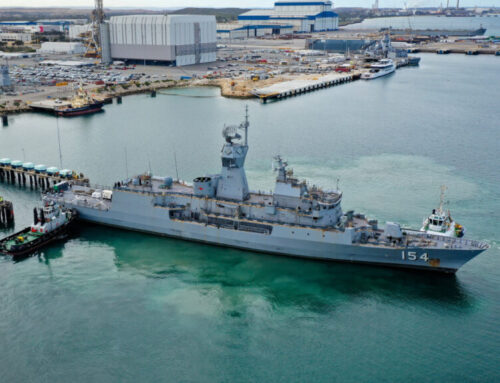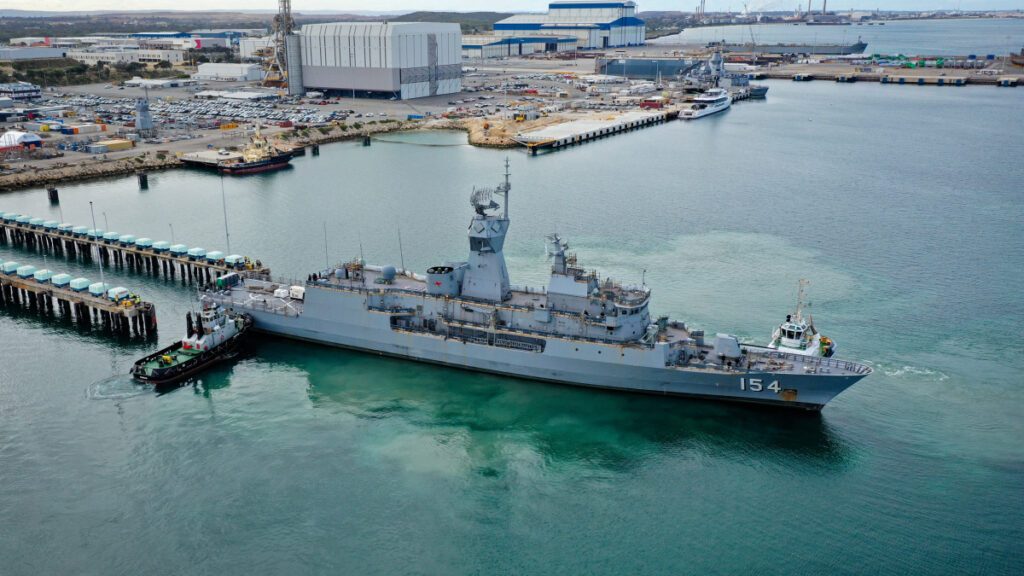In support of Operation Prosperity Guardian, a Sailor aboard the Arleigh Burke-class guided-missile destroyer 🇺🇸 USS Mason (DDG 87) uses high-powered binoculars to keep an eye on shipping in the Red Sea. (Task Force 153 via Twitter)
BEIRUT — In a first, the Houthi rebel group in Yemen attacked a Chinese vessel, twice, with anti-ship ballistic missiles, according to US Central Command, less than a week after the group reportedly pledged not to target Chinese and Russian ships.
Analysts told Breaking Defense the attack was likely a “mistake,” but was evidence of the potential for errors in the crowded Red Sea, where fears of escalation are ever-present.
Daniel Byman, a senior fellow at the Washington, DC-based think tank CSIS, said it’s possible the Houthis hit the Chinese ship on purpose, but the incident was “more likely to be an intelligence failure on the Houthis’ part, where they did not know or correctly identify the ownership of M/V Huang Pu. They have made identification mistakes before.”
In the very early morning hours on Saturday the Houthis purportedly fired four anti-ship ballistic missiles close to M/V Huang Pu, a Chinese oil tanker, according to CENTCOM. Twelve hours later, a fifth ballistic missile was fired towards the same vessel.
“M/V Huang Pu suffered minimal damage, and a fire on board was extinguished within 30 minutes,” CENTOM said. “No casualties were reported, and the vessel resumed its course. The Houthis attacked the MV Huang despite previously stating they would not attack Chinese vessels.”
For months now the Iran-backed group has fired rockets, missiles and drones, targeting all manner of commercial shipping in the Red Sea, but appeared to make a point not to interfere with Chinese ships. Last week Bloomberg reported the Houthis had reached a specific agreement with China and Russia to avoid harming their vessels.
Asked about the purported deal, a spokesperson for the Chinese Foreign Ministry said on Friday that “the Red Sea is an important international trade route for goods and energy. China calls on relevant parties to jointly protect the safety of the shipping lanes in the Red Sea in accordance with the law and earnestly respect the sovereignty and territorial integrity of the coastal countries along the Red Sea.
“China will continue to play a constructive role and make contribution to the early restoration of peace and stability in the Red Sea,” the spokesperson said.
As to Saturday’s incident Norman Ricklefs, who leads geopolitical consultancy NAMEA Group, told Breaking Defense that the important question is whether Houthis realized the ship was a Chinese one.
“It seems most likely that this was some kind of mistake,” he said.
Ali Bakeer, professor at Qatar University and non-resident senior fellow at the Atlantic Council’s Scowcroft Middle East Security Initiative, said the incident could have been the result of an “operational mistake or a technical issue,” adding that Houthi missiles are “not highly accurate.”
Still, even if it was an accident, the Houthis are “risking to escalate this issue beyond their quarrel with Israel and the West,” according to Andreas Krieg, CEO of MENA Analytica, a London-based strategic risk consultancy firm focusing on the wider Middle East.
“Drawing in China would be a mistake as China is already in close conversation with Iran over Houthi attacks. It could expose Iran to Chinese pressure and Beijing will not tolerate these attacks on the arteries of trade, which for China is the backbone of its economic great power posture,” Krieg said.
He added that Houthis operate as a network with limited central command and control, pointing that such a targeting might have been “a mistake or a rogue element within the networked organization.”
Either way, Krieg said the incident “shows how dangerous it is to equip a networked actor such as the Houthis with such a capability. The consequences for regional security are problematic. The Houthis are not an actor that can be trusted with such an activity.”
China has stayed on the sidelines when it comes to the various military coalitions in the Red Sea, joining neither the US-led Operation Prosperity Guardian nor the European Union’s EUNAVFOR Aspides. Beijing has individually resorted to escorting its ships along the Red Sea.
RELATED: Crowded waters: Who’s doing what in the international hotspot of the Red Sea
Until now Chinese ships appeared to have little to fear — so much so that other ships had reportedly hoisted Chinese flags or changed identification data to suggest they’re Chinese ships. Bakeer suggested such cat-and-mouse games could have “created confusion” as to what ship the Houthis thought they were targeting, as the M/V Huang Pu had reportedly previously been registered to a British firm.






![The sights from the 2024 Farnborough Airshow [PHOTOS]](https://centurionpartnersgroup.com/wp-content/uploads/2024/07/IMG_8722-scaled-e1721930652747-1024x577-hZjwVb-500x383.jpeg)




